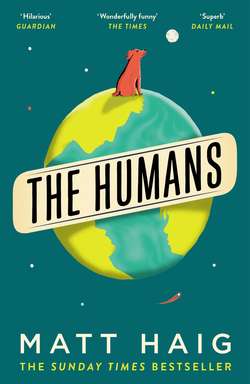Читать книгу The Humans - Matt Haig - Страница 25
На сайте Литреса книга снята с продажи.
The war and money show
ОглавлениеI watched the ‘television’ she had brought in for me. She had struggled with it. It was heavy for her. I think she expected me to help her. It seemed so wrong, watching a biological life form putting herself through such effort. I was confused and wondered why she would do it for me. I attempted, out of sheer telekinetic curiosity, to lighten it for her with my mind.
‘That was easier than I was expecting,’ she said.
‘Oh,’ I said, catching her gaze face-on. ‘Well, expectation is a funny thing.’
‘You still like to watch the news, don’t you?’
Watch the news. That was a very good idea. The news might have something for me.
‘Yes,’ I said, ‘I like to watch the news.’
I watched it, and Isobel watched me, both equally troubled by what we saw. The news was full of human faces, but generally smaller ones, and often at a great distance away.
Within my first hour of watching, I discovered three interesting details.
1. The term ‘news’ on Earth generally meant ‘news that directly affects humans’. There was, quite literally, nothing about the antelope or the sea-horse or the red-eared slider turtle or the other nine million species on the planet.
2. The news was prioritised in a way I could not understand. For instance, there was nothing on new mathematical observations or still undiscovered polygons, but quite a bit about politics, which on this planet was essentially all about war and money. Indeed, war and money seemed to be so popular on the news it should more accurately be described as The War and Money Show. I had been told right. This was a planet characterised by violence and greed. A bomb had exploded in a country called Afghanistan. Elsewhere, people were worrying about the nuclear capability of North Korea. So-called stock markets were falling. This worried a lot of humans, who gazed up at screens full of numbers, studying them as if they displayed the only mathematics that mattered. Oh, and I waited for the stuff on the Riemann hypothesis but nothing came. This was either because no one knew or no one cared. Both possibilities were, in theory, comforting and yet I did not feel comforted.
3. Humans cared more about things if they were happening closer to them. South Korea worried about North Korea. People in London were worried chiefly about the cost of houses in London. It seemed people didn’t mind someone being naked in a rainforest so long as it was nowhere near their lawn. And they didn’t care at all about what was happening beyond their solar system, and very little about what was happening inside it, except with what was happening right here on Earth. (Admittedly, not a great deal was happening in their solar system, which might have gone some way to explain where human arrogance came from. A lack of competition.) Mostly, humans just wanted to know about what was going on within their country, preferably within that bit of the country which was their bit, the more local the better. Given this view, the absolutely ideal human news programme would only concern what was going on inside the house where the human watching it actually lived. The coverage could then be divided up and prioritised on the basis of the specific rooms within that house, with the lead story always being about the room where the television was, and typically concerning the most important fact that it was being watched by a human. But until a human follows the logic of news to this inevitable conclusion, the best they had was local news. So, in Cambridge, the most important thing on the news was the story about the human called Professor Andrew Martin who was discovered walking unclothed around the grounds of the New Court at Corpus Christi College, Cambridge University, during the early hours of that morning.
The repeated coverage of this last detail also explained why the telephone had been ringing almost continuously since I had arrived, and why my wife had been talking about emails arriving into the computer all the time.
‘I’ve been fielding them,’ she told me. ‘I’ve told them you aren’t up to talking right now and that you are too ill.’
‘Oh.’
She sat on the bed, stroked my hand some more. My skin crawled. A part of me wished I could just end her, right there. But there was a sequence, and it had to be followed.
‘Everyone is very worried about you.’
‘Who?’ I said.
‘Well, your son, for a start. Gulliver’s got even worse since this.’
‘We only have one child?’
Her eyelids descended slowly, her face was a tableau of forced calm. ‘You know we do. And I really don’t understand how you left without a brain scan.’
‘They decided I didn’t need one. It was quite easy.’
I tried to eat a bit of the food she had placed by the side of the bed. Something called a cheese sandwich. Another thing humans had to thank cows for. It was bad, but edible.
‘Why did you make me this?’ I asked.
‘I’m looking after you,’ she said.
A moment’s confusion. It was slow to compute. But then I realised, where we were used to service technology humans had each other.
‘But what is in it for you?’
She laughed. ‘That question’s been a constant our whole marriage.’
‘Why?’ I said. ‘Has our marriage been a bad one?’
She took a deep breath, as if the question were something she had to swim under. ‘Just eat your sandwich, Andrew.’
